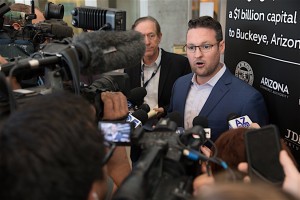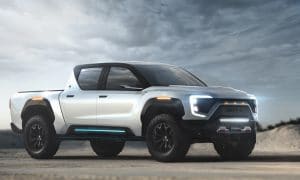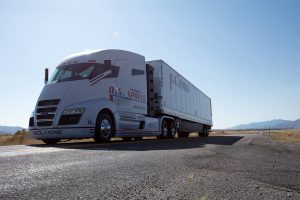
Nikola Corp. CEO Trevor Milton talks about the company’s plans to build a $1 billion facility near Phoenix.
Fuel cell technology leader Nikola Corp. completed its merger with VectoIQ Acquisition Corp. netting $700 million in cash, a new ticker symbol and some high-powered help in the form of a new board member.
The deal, which was initially announced in March, just needed the approval of VectoIQ shareholders, and that happened Tuesday. Already trading on the NASDAQ, the new version of Nikola – it was Nikola Motors until now – got a new ticker symbol: NKLA. In midday trading it’s at $19.62, which is 9.2% jump compared to its first-day closing price.
Nikola is perhaps best known for two things: its fuel cell-powered semi truck, also called the Nikola, and its ever-growing network of hydrogen fueling stations to power those Iveco-based rigs. The merger plus some additional new investment nets the Phoenix-based company $700 million, which plans to use to build a state-of-the-art manufacturing facility in Coolidge, Arizona, and continue its hydrogen station infrastructure roll out.
(Nikola Motors announces plan for ZEV pickup — combining battery and hydrogen power.)
“Nikola is thrilled to complete the Nasdaq listing and be part of the ESG investment world said Nikola’s Founder and Executive Chairman Trevor Milton in a statement. “This is a significant endorsement in fuel-cell and battery-electric technology.
“Since Nikola launched its first fuel-cell semi-truck, you have seen the world rally behind hydrogen and follow our lead. What was once considered the fuel of the future is now accepted as today’s solution. With our Nikola Iveco joint venture and over $10 billion in pre-order reservations, Nikola is positioned to be a wonderful story of how one company can literally change the world.”
Some have compared Nikola to Tesla, in the sense that it’s a start up looking to ensure its products can actually be used by building out the hydrogen fueling network the trucks need. The company isn’t just a one-trick pony as its also working electric vehicles as well.
Actually, its battery-electric Class 8 truck – the Nikola Tre – will be first to market, hitting the road next year. It will be followed by the Nikola Two Class 8 FCEV starting in 2023. The aforementioned build out of hydrogen fueling stations will serve Nikola customers’ fleets, such as Anheuser-Busch, the company notes.
(Nikola Motors claims “holy grail of batteries” doubles range, halves price.)
However, also like Tesla it now features a well-known figure who was, at one time, recognized for his forward and honest opinions about business, Steven Girsky. VectoIQ’s former chairman and CEO Girsky is now a member of Nikola’s board of directors. A former Wall Street investment analyst, he made a big move to become a member of General Motors board of directors, helping restructure the company as it emerged from bankruptcy in 2009.

The Nikola Badger will pair a hydrogen fuel-cell stack with a large lithium battery pack to deliver up to 600 miles range.
He stayed on after, taking the role of vice chairman, leading the company’s strategic efforts to continue becoming leaner and more profitable. He left GM in 2014. However, the comparisons to Tesla aren’t limited to just an outspoken executive and a growing refueling network. The company drew more comparisons when it introduced its new battery-electric pickup truck, the Nikola Badger in February.
What separates the Badger from Tesla’s Cybertruck (and Rivian, Bollinger, Ford and GM’s coming offerings) is its power source. It uses a blend of two different power sources: a battery pack and a hydrogen fuel cell stack.
Unlike the plug-in hybrids that are becoming increasingly common, both of the power sources for the Nikola Badger will be emissions-free. And each would provide relatively long range on their own, about 300 miles for the 160 kilowatt-hour lithium-ion battery pack and roughly the same distance using just hydrogen.
The approach would allow a customer to revert to one or the other, depending upon which energy source – or sources – might be available.
(Nikola sues Tesla over alleged patent infringement.)
While there are now an estimated 24,000 public battery charging stations around the U.S. there are still wide gaps in the network, especially in mid-America. Hydrogen stations are in even shorter supply, though Nikola Corp. officials have announced plans to eventually set up 700 pumping stations across North America. It also produces battery-electric off-road vehicles and wave runners.

